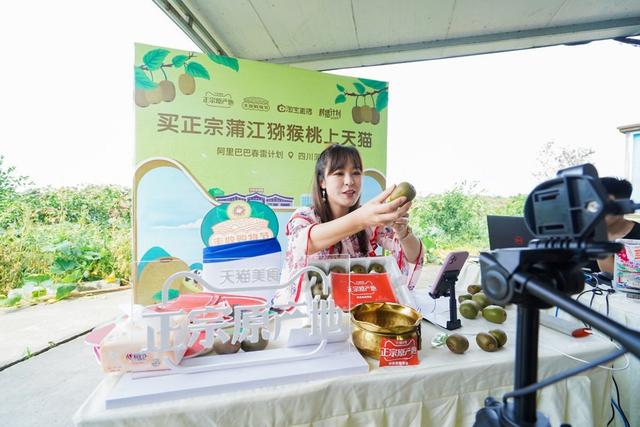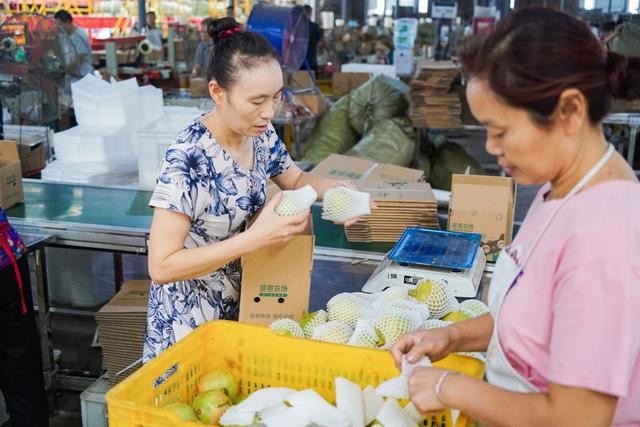
A livestreaming anchor promotes fruit produce online in Pujiang County, Chengdu City, Southwest China's Sichuan Province.
Prior to 2013, Pujiang native Xiao Huaidong had little career prospects and ambitions and worked a comfortable job in Chengdu, the capital city of southwest China's Sichuan Province. However, that changed when he spotted a life-changing opportunity in his hometown's offline fruit wholesaling industry.
In 2015, he opened a store on Taobao, a popular online shopping destination for Chinese consumers seeking a wide selection of products. Xiao's attempt to broaden his sales channels was a success. When calculating end-of-year sales, it took him by surprise when he found that his Taobao store had sold more than RMB 5 million worth of products. Xiao's business has since experienced exponential growth. In just a few years, his company has grown from a single kiwifruit wholesale store into an integrated e-commerce platform that links up many sectors of the fruit value chain, including purchasing, refrigeration, sorting, packaging, logistics, and even carton packaging production. And the logistics cost has been reduced from RMB 4 per 3 kg to only RMB 2 per 3kg.
Located in the southwest area of the Sichuan Basin, Pujiang boasts some of the most fertile land in southwestern China. As such, it has been designated as a national ecological demonstration area, a demonstration county for standardised agricultural production, a production base for high-quality hybrid citrus, and a globally recognised area for high-quality kiwifruit production. The kiwifruit produced in the county was listed as a Geographical Indication product in China in 2010.
In 2016, Pujiang was approved to be named both a provincial and national level demonstration county for comprehensive rural e-commerce development. It then issued a series of policies to support related entities. These entities include those that conduct business on established e-commerce platforms, those that build new e-commerce platforms, those that introduce products to popular e-commerce companies, startup e-commerce companies, or e-commerce companies listed on the stock exchange. The policies also served to construct e-commerce industrial parks, foster e-commerce development in rural areas, promote online and offline integration, and create an environment conducive to e-commerce development.
On 15 October, 2016, a strong incentive policy came into effect, with an aim to further boost motivation and enthusiasm amongst local farmers. At that time, almost anyone who opened a store on Tmall could receive an award or subsidy from the government, and those who generated significant sales could even receive a one-time award of up to RMB 1 million. Officially known as Taobao Mall, Tmall is Alibaba's dedicated B2C platform and the most visited B2C online retail platform in China.
In 2019, Tmall launched its "authentic geographical origin project", and Pujiang's high-quality kiwifruit was one of the selected products.
In August 2020, the Pujiang government, Taobao's parent company Alibaba and Pujiang kiwifruit merchants officially launched their strategic digitisation-driven cooperation agreement, which has since been helping to expand the scale of online sales and amplify the Pujiang kiwifruit brand.
Today, the daily cold storage capacity in Pujiang is 130,000 tonnes and the county's online stores enjoy the lowest delivery price but the fastest delivery speed in China. Every day, about 800,000 items of fresh produce are delivered from Pujiang to various destinations across China. In addition to Sichuan fruits, fresh produce with other provincial origins, such as Shaanxi, Yunnan, and Hainan, are also shipped to Pujiang. Fresh produce has also been shipped to Pujiang from Southeast Asia.
At the Southwest E-commerce Logistics Centre in Pujiang, fruits and other fresh produce originating from outside the county exceed 40 percent of its total delivery within this category. These produce include mangoes, pomegranates, as well as potatoes from the counties of Zhaojue and Meigu, which are located in the once-impoverished Daliang Mountains region of Sichuan.
Taobao merchants like Xiao have not only sold Pujiang's high-quality kiwifruits and citrus across China, they have also attracted fruit sales from overseas vendors in countries like Vietnam and Thailand. In that sense, Pujiang has served as a "springboard" into the Chinese market for fresh produce businesses based in Southeast Asia.
During a side event at Alibaba's 2020 Harvest Festival in Pujiang, Xiao shared insights into the fact that in-depth cooperation with platforms such as Taobao and Tmall enabled his company's annual sales to soar from RMB 5 million in 2015 to more than RMB 300 million in 2019. He also noted that there were plans for sales to exceed RMB 500 million in 2020.

Two staff members pack fruits in Pujiang.
After 10 years of close cooperation in 2020, Pujiang's fruit industry and Alibaba's upstream and downstream partners jointly created a rural e-commerce model that facilitates the buying and selling of products throughout China. Through this model, many Taobao and Tmall merchants in Pujiang are able to deliver 30,000 to 50,000 orders a day.
In order to capitalise on China's burgeoning e-commerce trend, the Pujiang government in 2020 established a live broadcast base and invited trainers from platforms such as Taobao Live, Alibaba's dedicated livestreaming channel, to help students become livestreaming anchors after graduation.
As of 2020, there were more than 30,000 employees in the rural e-commerce industry chain in Pujiang, accounting for 11% of the county's total population. Meanwhile, the per capita disposable income of farmers had increased by nearly RMB 5,000 during the previous five years, and the number of e-commerce operators in Pujiang had exceeded 5,000.
In the past, more than 10,000 Pujiang locals moved elsewhere for work every year. Today, most of them have returned to their hometowns to participate in Pujiang's upstream and downstream agricultural industry chain.

For more information, please contact WFP China COE (wfpcn.coe@wfp.org)
Category
Pujiang's Journey to Becoming China's Largest Taobao Fruit E-Commerce County
Contributor
Pujiang's Journey to Becoming China's Largest Taobao Fruit E-Commerce County
Country
Story

